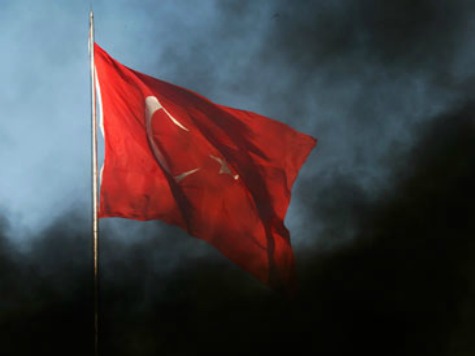Turkey has contributed to the rise of the brutal Islamic State by turning a blind eye to the ongoing flow of money, weapons, illegal oil, and fighters across its border to the jihadist group in Syria, according to a new report.
Jabhat al-Nusra, the al-Qaeda affiliate in Syria, and other terrorist groups have also benefited from the lack of security on the Turkish side of the porous Turkey-Syria border where the report says active cells linked to the Islamic State (IS, also known as ISIS, and ISIL) can be found.
“All of this has raised questions about Turkey’s value as an American ally, and its place in the NATO alliance,” notes the report authored by the Jonathan Schanzer and Merve Tahiroglu from the Foundation for Defense of Democracies (FDD).
It also reveals that there are many ISIS sympathizers inside Turkey.
“Turkey appears to have contributed to the rise of extremism in Syria. Multiple reports suggest that extremists of all stripes have exploited Turkey’s porous border with Syria over the last several years, and now IS is reaping the benefits,” says FDD.
“There now appears to be IS cells active inside Turkey’s border,” the report continues. “Turkey has also cut at least one prisoner swap deal with IS that resulted in the release of militants who returned to the front. Turkey’s southeastern frontier [bordering Syria] is a transit point for fighters, weapons, cash, and more.”
ISIS has conquered large swaths of territory in Iraq and Syria with the help of foreign fighters traveling through Turkish territory to provide the jihadist group with reinforcements.
In August, President Obama ordered airstrikes against ISIS-targets in Iraq. That operation, which is supported by an international coalition that includes Arab nations, was expanded to Syria the following month.
Kurdish forces, with the help of the U.S.-led air attacks, have been combating ISIS militants for months in the strategic Syrian town of Kobani along that country’s border with Turkey.
Turkey, a member of NATO and American ally, has refused to participate in the U.S.-led campaign against ISIS despite their proximity to the conflict.
“The IS crisis has put Turkey and the U.S. on a collision course. Turkey refuses to allow the coalition to launch military strikes from its soil. Its military also merely looked on while IS besieged the Kurdish town of Kobani, just across its border,” explains the report.
“Meanwhile, the border continues to serve as a transit point for the illegal sale of oil, the transfer of weapons, and the flow of foreign fighters,” adds FDD. “Inside Turkey, IS has also established cells for recruiting militants and other logistical operations.”
The porous 565-mile long border that Turkey shares with Syria has also benefited Jabhat al-Nusra, the al-Qaeda affiliate in Syria.
“By September 2013, Jabhat al-Nusra was said to have 7,000 to 8,000 militants fighting in Syria,” reveals the report. “Approximately one-quarter of these fighters were foreign jihadists, who reportedly crossed into Syria from Turkey.”
Both the al-Nusra Front and ISIS have gained from the terrorism finance, weapons smuggling, illegal oil sales, and the transit of fighters that takes place in southeastern Turkey, mentions the report.
Regarding the ISIS sympathizers in Turkey, FDD says, “Ali Ediboglu, a Turkish opposition deputy, claims that ‘at least 1,000 Turkish nationals are helping … foreign fighters sneak into Syria and Iraq to join ISIS.’ Youtube videos depict IS gatherings in Istanbul and demonstrations of support by Turkish citizens for the jihadi fighters in Syria, including IS.”
The presence of ISIS and other jihadist groups inside Turkey render the Turks susceptible to attacks and may be a reason why the country has refrained from taking a hostile action against the terrorists, suggests the report.
Washington may need to consider “sanctions against Turkish nationals or entities that facilitate the flow of cash, fighters, and other materiel across the Syrian border,” FDD suggests, later adding that the U.S. may also need to “threaten the cessation of military or intelligence cooperation if the right results are not reached.”
“Turkey must now understand that while America’s Syria policy may have been feckless, its border policy has been reckless…Turkey has greatly exacerbated the Syria crisis. Some might even argue that Turkey could now qualify as a State Sponsor of Terrorism for abetting [al-Nusra and ISIS],” concludes the report.

COMMENTS
Please let us know if you're having issues with commenting.